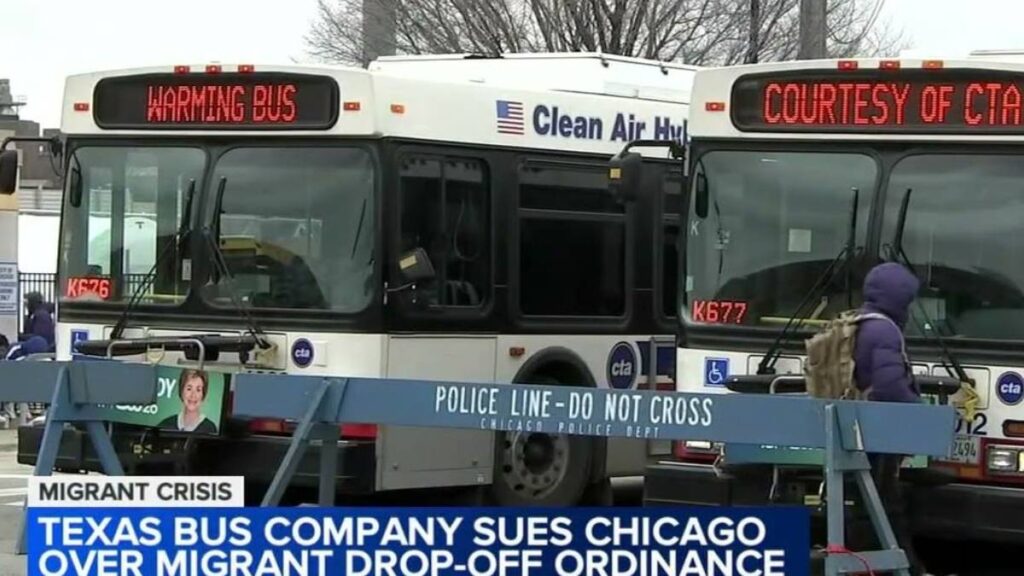Wayne Transportation, a Texas-based bus company, has filed a lawsuit against the City of Chicago on its migrant drop-off ordinance. The ordinance, which regulates where and how buses can discharge migrants within the city, has become a subject of heated legal dispute.
The ordinance, enacted on December 8, 2023, regulates and manages the arrival of migrants within the city’s limits. The rule requires buses to provide prior notification before dropping off migrants. That way, it addresses concerns related to public safety, logistical planning, and allocation of resources. To ensure compliance, the ordinance imposes heavy fines and the risk of bus impoundment.
Texas Governor Greg Abbott initiated this rule to relieve the strain on border cities dealing with the influx of migrants. However, the surge of migrants’ pressure on the city pushed mayors to appeal for federal assistance.
Over the past 18 months, Chicago experienced the arrival of over 34,000 asylum seekers. These individuals arrived on approximately 600 buses originating from Texas. The influx of a large number of asylum seekers has raised concerns about their accommodation and asylum support.
ALSO READ: Chicago Migrants Face Harsh Weather Conditions as Abbott Refuses to Stop Drop-Offs
Recently, Chicago issued harsh penalties to transportation companies that defaulted in dropping migrants at designated zones, including Wynne Transportation. The subcontractors working with Wynne Transportation faced over 90 lawsuits filed by the city of Chicago. These lawsuits alleged violations of the city’s regulations and carry potential fines ranging from $2,000 to $10,000.
Now the company is fighting back against Chicago by suing the city. The company alleges that the lawsuits have caused legal and financial burdens on them. “This interferes with their business a great deal, and it’s intimidating for these subcontractors who are mostly smaller operators,” Michael Kozlowski, a Chicago-based attorney representing Wynne, told The Associated Press.
POLL: Should the U.S. Government Create a Path to Citizenship for Undocumented Immigrants?
The complaint filed by the bus company counters that the ordinance unfairly targets its operations and infringes upon its rights. Wynne Transportation repeatedly stresses the importance of passengers’ rights and suggests that Chicago’s regulation of bus operators discriminates against migrants.
The company argues that by imposing regulations targeting bus operators, the city restricts migrants’ rights to travel and seek asylum. The lawsuit also contends that Chicago’s creation of its immigration policy violates the U.S. Constitution’s supremacy clause. The supremacy clause establishes that federal laws precede conflicting state or local laws.
ALSO READ: Chicago Residents Criticize Leaders Over Skyrocketing Homelessness Amid Migrant Crisis
Now, the company asserts that Chicago is overstepping its authority by encroaching upon an area reserved for federal regulation. “Rather than welcoming migrants and giving them sanctuary, Chicago is turning its back on those wishing to travel here by enacting an ordinance that targets the transportation companies that transport migrants from our southern border to their desired destination,” the suit stated.
The lawsuit, which recently gained media attention, mentions no individual migrants or asylum-seekers. Instead, the focus is on the broader issue of passengers’ rights. As of now, Chicago has not filed a response to the lawsuit lodged by Wynne Transportation.
The absence of a response from Chicago suggests that the city is carefully considering its legal strategy for addressing the allegations. As the case progresses, further developments are anticipated.
You Might Also Like:
Biden Campaign Team Dismisses 3rd-Party Threats Ahead of 2024 Elections
Authorities Ramp Up Security at Megan Thee Stallion’s Mother’s Grave Amid Feud With Nicki Minaj
“I Think It’s Politics,” Burgum Says About Trump’s Attacks on Haley
Marjorie Taylor Greene Proposes That COVID-19 Vaccines Should Be Illegal To Fund
Officials Arrest Stalker Outside Taylor Swift’s Home for the Second Time in Three Days
